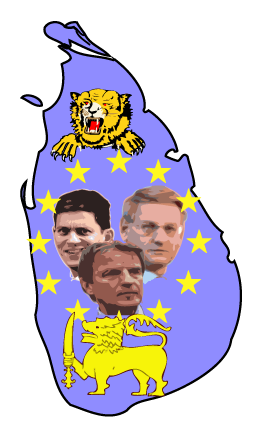The EU goes in with force in Sri Lanka April 26, 2009
Posted by Sverre in : World politics , trackback
Norway’s role as peace broker in Sri Lanka seems pretty much played out after Norwegian police failed to prevent damage to the Sri Lankan embassy in Oslo on the hands of Tamil protesters. The Sri Lankan government has reputedly declared Norway unwanted in the process.
But according to Swedish foreign minister Carl Bildt’s blog, he is going to Sri Lanka to try and handle the humanitarian situation – together with French foreign minister Bernard Kouchner and their British counterpart David Milliband. It’s a real show of force from EU to apply pressure on the parts of the conflict to refrain from further bloodshed. It may also be a sign that the EU is really serious about its role as a global peace broker with a different focus than that of the US.
The Tamil Tigers (LTTE) have according to various media already asked for a cease fire, but the Sri Lankan government has rejected it, demanding a complete surrender.
Comments
I doubt if the ‘show of force’ by the EU foreign ministers will have much effect in trying to intimidate the Rajapakse brothers into ceasing operations before the LTTE is wiped out.
It is clear to all now, that only an unconditional surrender by the LTTE will end this war and ceasefires and delays will only exacerbate the huminatarian crisis.
The only useful thing EU can do is add further pressure on the LTTE to surrender and provide as much relief aid as possible to help the innocent tamil civilians.
I must admit to knowing precious little about Sri Lanka. My knowledge is from the news. But from what I’ve heard, I fear you’re right, and that this is more significant for EU and its role as a global “defender of the peace” than in terms of actual outcomes for the suffering civilians of Sri Lanka.
But do you think we will actually see an actual surrender by LTTE? Do you think they will actually be willing to declare that they have lost the liberation struggle?
Having worked with the crisis for some 16 months meeting the parties on all sides (not only the warring parties but Muslims, civil society, church leaders etc) and seeing this tragedy unfold in 2005 and 2006 it is somewhat annoying and sad that the EU (and the US) hasnt come out much stronger until now in its response to the civil war in Sri Lanka. As with the case with Gaza it is important to work at higherst levels to prevent and/or mitigate the escalation and crisis situation and pressure the parties to choose other avenues to address the legitimate grievences of all the peoples of Sri Lanka. Nothing escuse war crimes or serious violations of humanitarian laws…both sides have and continue to commit such crimes and only a negotiated political solution will finally end the conflict. It is clear that the current government saw its chance to tilt the balance at any future negotiation table by choosing the war-option, but to which price one can ask and with which means……
Yes, it seems especially strange that they are getting so heavily involved now and not at least at the beginning of this last escalation a few months ago. I think one of the reasons might be that a fairly successful suppression of the media by the Sri Lankan government has made it difficult to mobilize civic society in the west to pressure their leaders.
Well, until winter/spring Norway and Iceland had people on the ground and until September 2006 also Sweden, Denmark and Finland had people on the ground…so the knowledge what was/is going on and why is there amongst the leadership in the European countries where also the UK, France and some other EU countries are are well aquinted with the situation..so is the US and Japan as well as India and China (China now “buying up” most infrastructure projects in SL)…there would clearly been possible to stand up for for the protection of human rights and for a peaceful solution much stronger in the UNSC and other forum than what has been the case…..the problem in terms of civic society and its engagement and the media I agree in that it is a media problem here in the West not adquately covering the conflict (even if you dont have direct access to the war zone there are thousands of refugees etc to gather information from)…international organisations and NGOs have repeteadly reported the escalation, the humanitarian situation and the developments such as HRW, ICRC, Unicef etc…so here again there is plenty of information from media to pick up on…for me who seen it first hand there is no excuse for this lame and late action…I am certainly happy to see the three EU FM now travelling there…but much too late in my opinion…however, hopefully it can still save thousands of lives..which is noble in itself….
The problem is that it isn’t “sexy enough” for media to keep a prolonged interest in a conflict far away when they can’t be on the ground and report directly from what’s happening. That’s why I think the Sri Lankan journalist ban has actually been somewhat effective in reducing pressure on the government.